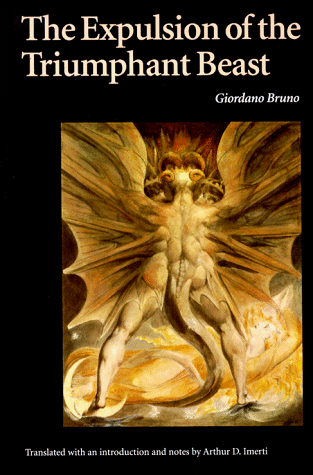"Among the heretics of every age, we find men who are filled with the highest kind of religious feeling," Albert Einstein said. He might have been referring to the sixteenth-century Italian philosopher Giordano Bruno, who was tried by two Inquisitions and burned at the stake in Rome in 1600. Bruno's most representative work, Spaccio de la bestia trionfante (The Expulsion of the Triumphant Beast), published in an atmosphere of secrecy in 1584 and never referred to as anything but blasphemous for more than a century, was singled out by the church tribunal at the summation of his final trial. That is hardly surprising because the book is a daring indictment of the corruption of the social and religious institutions of his day. The "triumphant beast" signifies the reign of multifarious vices. Cast in the form of allegorical dialogues, Bruno's work presents the deliberations of the Greek gods who have assembled to banish from the heavens the constellations that remind them of their evil deeds. The crisis facing Jove, the aging father of the gods, is symbolic of the crisis in a Renaissance world profoundly disturbed by new religious, philosophical, and scientific ideas. Arthur D.
Imerti, former head of the Department of Foreign Languages at the New School for Social Research in New York City, provides a brilliant introduction to the philosopher who dared to voice his audacious theories of nature, religion, and history.
- ISBN10 0803261047
- ISBN13 9780803261044
- Publish Date 1 May 1992
- Publish Status Out of Stock
- Out of Print 31 January 2017
- Publish Country US
- Imprint University of Nebraska Press
- Format Paperback (US Trade)
- Pages 336
- Language English
